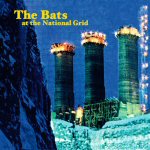 It almost seems reactionary to release an album as good and straightforward as the Bats' latest, At the National Grid. Armed with a truckload of talent and an ear for pop craft that major record labels should be killing for, the band cheerfully and quietly puts out solid records like other bands do drugs and get hyped-up reviews. It's a skill that seems woefully under-appreciated at times, as press is diverted by colorful back stories, the exoticism of lesser-known cultures and their (sometimes great, sometimes merely adequate, but different) music offerings, and the good ol' thrill-of-anything-new game. The Bats aren't playing along. They're too busy working some day jobs and putting out records whenever they get a chance (this one is their sixth in 23 years). And it wouldn't seem reactionary if it weren't so good.
It almost seems reactionary to release an album as good and straightforward as the Bats' latest, At the National Grid. Armed with a truckload of talent and an ear for pop craft that major record labels should be killing for, the band cheerfully and quietly puts out solid records like other bands do drugs and get hyped-up reviews. It's a skill that seems woefully under-appreciated at times, as press is diverted by colorful back stories, the exoticism of lesser-known cultures and their (sometimes great, sometimes merely adequate, but different) music offerings, and the good ol' thrill-of-anything-new game. The Bats aren't playing along. They're too busy working some day jobs and putting out records whenever they get a chance (this one is their sixth in 23 years). And it wouldn't seem reactionary if it weren't so good.
For those who have missed the Bats, here's the basics. Take the sound of early to mid-'80s college radio, throw in some pretty Velvet Underground influences, add the term "jangle pop" and a touch of psychedelia and what you have is a recipe for good tunesmiths, i.e. the Bats. "They say it's all about the journey," Robert Scott sings on "Horizon" and At the National Grid reinforces that idea through the course of the its 43 minutes. Listening is less about what's cool as it is what's beautiful about settling in with solidity. One sits back and enjoys the ride, content to momentarily escape the ups and downs that go along with keeping au courant with the rest of the music-loving world. That steadiness provides perfect moments as when the line "I just want to see the world through different eyes" is earnestly sung on "Pre War Blues" or Kaye Woodward's voice comes in on "Up to the Sky", or when one realizes that the Bats are good enough to have an intro become a song, as they do on "Hubert".
It's not until the fourth or fifth listen that the strength of the production (done by The Bats with John Kelcher as engineer, and mastered by Dale Cotton) really kicks in. It's simple really: the band (the aforementioned Robert Scott and Kaye Woodward, plus Malcolm Grant and Paul Kean) is so good together that there doesn't need to be any tricks. Everything seems recorded near the same level which, of course, could be a muddled mess. It turns out to be just right here. The band, the voices, the lines coming in and out are only complementary to one another. The spaces needed to let the song through are already inherent in the whole of the band; any additional production techniques would be too much. The listener can hear everything. If one wants to follow the bass line, she can, while the same goes for every other instrument.
To switch to the personal, and to quote another PopMatters writer, Rob Horning, "...once I finish reviewing an album, I never feel like listening to it...". At the National Grid is a rare exception to this truth. Not only did I find myself Not Sick of this record, I verily became more and more enamored of it. I asked myself why, as I have barely listened to CDs I have reviewed and given higher ratings to. I think the answer lies in the overall effect. The Bats will not change the course of music. They will not start a revolution. They can, though, make an individual life a little brighter for the better part of an hour. Some artists choose this course instead of the radical one and I thoroughly appreciate and applaud them. It makes me want to listen over and over again.